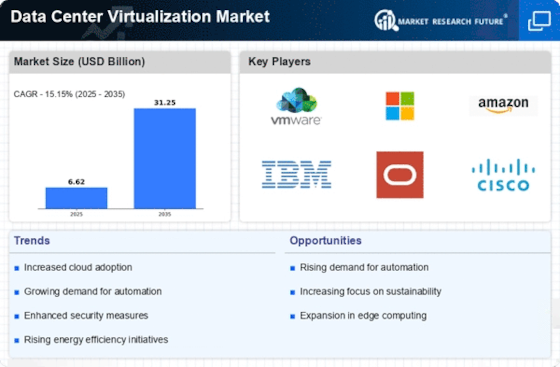Market Share
Data Center Virtualization Market Share Analysis
The Data Center Virtualization market is influenced by a spectrum of factors that collectively mold its growth and impact its dynamics. A primary driving force is the relentless demand for increased efficiency and flexibility in data management. Data center virtualization, which involves creating virtual representations of computing resources, storage, and networks, allows organizations to optimize resource utilization, enhance scalability, and streamline data operations. This becomes especially critical in an era where businesses are navigating vast amounts of data and seeking agile solutions to meet ever-evolving computing needs.
Cost considerations play a pivotal role in shaping the dynamics of the Data Center Virtualization market. The virtualization of data center infrastructure often translates into significant cost savings. By consolidating servers, reducing physical hardware requirements, and minimizing energy consumption, organizations can achieve cost efficiencies while maintaining or improving overall performance. The appeal of cost-effective solutions drives the adoption of data center virtualization across various industries.
Scalability is another key factor influencing the Data Center Virtualization market. The ability to scale computing resources dynamically in response to changing demands is a critical advantage of virtualization. Businesses can adapt their data center capacities without the need for extensive physical upgrades, enabling them to meet the fluctuating requirements of their applications and workloads efficiently. This scalability factor contributes to the attractiveness of data center virtualization solutions.
Security considerations are paramount in the Data Center Virtualization market, given the sensitivity of the data and applications hosted in virtualized environments. Virtualization security technologies, such as hypervisor security and network segmentation, are essential to protect against potential threats. The capability of data center virtualization solutions to provide robust security measures influences their adoption, particularly as organizations prioritize safeguarding their digital assets.
Interoperability is a critical consideration in the Data Center Virtualization market. The ability of virtualized environments to seamlessly integrate with existing IT infrastructure and support diverse applications is essential for their successful deployment. Compatibility with different operating systems, applications, and hardware platforms enhances the flexibility and adaptability of data center virtualization solutions, making them more appealing to organizations with diverse technology stacks.
Technological advancements and innovation are inherent to the Data Center Virtualization market. Continuous research and development efforts focus on enhancing the features and capabilities of virtualization technologies. Integration of artificial intelligence and machine learning, automation, and orchestration tools contributes to the evolution of data center virtualization, enabling more intelligent resource management, predictive analytics, and efficient workload optimization.
Competition among data center virtualization solution providers shapes the overall landscape of the market. Industry leaders such as VMware, Microsoft, and Citrix, along with a host of other players, compete to offer comprehensive and scalable virtualization solutions. Strategic partnerships, collaborations, and acquisitions contribute to the competitive dynamics, influencing the choices available to businesses seeking data center virtualization solutions.
Regulatory compliance and adherence to industry standards impact the Data Center Virtualization market. Organizations must ensure that their virtualized environments comply with data protection regulations and industry-specific requirements. The ability of data center virtualization solutions to facilitate compliance, secure sensitive data, and support auditing processes becomes a critical factor in their adoption, particularly in regulated industries such as finance and healthcare.
Environmental sustainability is gaining prominence as a market factor. Green initiatives, such as energy-efficient data centers and environmentally conscious hardware designs, contribute to the overall appeal of data center virtualization solutions. Businesses increasingly consider the environmental impact of their technology choices, and virtualization aligns with the goal of achieving sustainability in data center operations.



















Leave a Comment